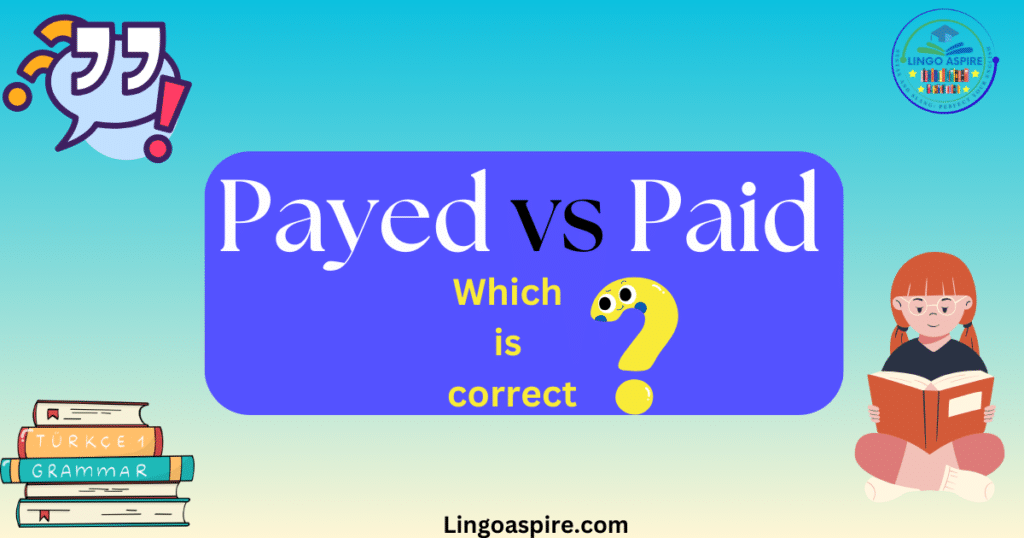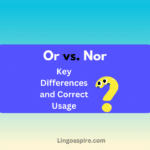When you write, it’s easy to get confused between Payed vs. Paid. One of the most common mistakes in English is using “payed” instead of “paid”. You might have seen this mistake often, and it can cause confusion, especially for those learning English. Understanding the difference between “pay”, “paid”, and “payed” is crucial for clear and accurate communication. In this article, we’ll take an in-depth look at the proper use of these words, their meanings. The common mistakes that occur when they are used incorrectly. By the end of this article, you’ll be fully understand and use Payed vs. Paid correctly in every situation.
Understanding the Verb “Pay”
The word “pay” is an irregular verb, meaning its past tense doesn’t follow the usual pattern of adding “-ed.” Most verbs form their past tense by simply adding “ed,” but “pay” doesn’t. The verb “pay” means giving money for something, settling a debt, or compensating for goods or services. Over time, “pay” has evolved to include meanings like “pay attention” or “pay respect.” It also refers to financial transactions such as paying bills, debts, or workers. This evolution has made “pay” crucial in everyday English.
The verb “pay” refers to the action of giving money in exchange for something, settling a debt, or compensating someone for a service or goods. Over time, this verb has taken on several different meanings, ranging from “pay attention” to “pay respect.” It has also evolved to include a financial sense where it refers to transactions like paying bills, paying debts, or even paying workers. These meanings have made the verb “pay” an essential part of everyday English, especially in the context of financial transactions and debt repayment.
The Correct Spelling: “Paid”
The correct past tense form of “pay” is “paid.” This word is the only acceptable form of the verb in the past tense and past participle. For instance, we say, “I paid for the groceries” or “She paid the bills yesterday.” The word “paid” is not just a past tense; it also serves as the past participle, which means it can be used in perfect tenses like “have paid” or “had paid.”
It’s important to note that “paid” is also used as an adjective in some situations. For example, in terms like “paid vacation” or “paid leave,” it refers to compensation for time off work. The confusion between “paid” and “payed” arises because some people mistakenly try to follow a regular verb conjugation rule, but “pay” is an irregular verb, and it simply doesn’t follow the usual pattern.
The Common Mistake: “Payed”
Now that we’ve established that “paid” is the correct form, let’s address “payed.” The use of “payed” is often seen in everyday writing, but it’s incorrect. Many English learners are influenced by other irregular verbs that look similar to “pay,” such as “lay” and “pay,” which both change their form in the past tense. While “lay” becomes “laid,” and “pay” becomes “paid,” “payed” doesn’t fit the standard grammar rules.
The mistake is also common in specific contexts, especially in older texts or technical writing. For example, in nautical contexts, the term “payed out” is used to describe letting out or slackening a rope or chain. While this may sound like “payed” should be correct, it is not the verb “pay” in the financial sense, but a seafaring terminology. It refers to a completely different action related to maritime terminology.
Payed vs. Paid: Key Differences
Let’s explore the key differences between Payed vs. Paid more deeply. “Paid” is the correct form for both the past tense and past participle of the verb “pay”. This applies in both financial contexts and when used in phrases like “pay attention” or “pay respect.” On the other hand, “payed” should be reserved for certain nautical meanings of pay, which are unrelated to financial transactions.
For example, “paid off” means that you have settled a debt. It’s an expression commonly used in the context of debt repayment or paying bills. In contrast, “payed off” has no place in standard English when referring to money. You would never say, “I payed off the loan”; it’s always “paid off.” In addition, there are several phrases, such as “paid leave” or “paid vacation”, where “paid” is used to describe compensation in a work or employment context.
| Aspect | “Paid” | “Payed” |
|---|---|---|
| Correct Usage | Correct form of the verb “pay” in both past tense and past participle. | Incorrect form in most contexts, except specific nautical terminology. |
| Grammar | Irregular verb, follows the rule of past tense and past participle. | Not accepted in standard English grammar; incorrect in financial contexts. |
| Meaning | Refers to giving money in exchange for goods/services, or settling debts. | Rarely used, mostly seen in maritime or seafaring contexts. |
| Examples | “I paid my bills.” / “She has paid for the groceries.” | Incorrect in most sentences: “I payed the bill” (should be “paid”). |
| Use in Nautical Context | Not used in maritime language. | Can be used to describe actions like “paying out rope” or “paying off ship.” |
| Common Phrases | “Paid attention”, “Paid off”, “Paid vacation”, “Paid leave” | Incorrect in phrases like “Payed attention”, “Payed off”. |
Examples of “Paid” in Different Tenses
To fully grasp the use of “paid,” it’s helpful to look at how it works in different tenses. “Paid” is a past participle, which is used in perfect tenses. Here are some examples:
- Present Tense: “I pay my rent every month.”
- Past Tense: “I paid the rent yesterday.”
- Present Perfect Tense: “I have paid the rent already.”
- Past Perfect Tense: “I had paid the rent before I left.”
- Future Perfect Tense: “By next week, I will have paid the rent.”
These examples show the flexibility of “paid” as a past tense and past participle, both in financial transactions and other contexts. Whether you’re talking about paying bills, paying attention, or any other type of payment or debt repayment, “paid” will always be the correct word to use.
Common Confusions: Payed vs. Paid in Phrases
Now, let’s take a closer look at how “paid” is used correctly in common phrases, as opposed to “payed.”
One of the most common phrases is “pay attention.” This expression means to focus or take notice of something. For example, “You need to pay attention to the instructions.” Many people mistakenly write “payed attention”, but the correct form is “paid attention.”
Another common phrase is “paid off.” It refers to something that has been settled, particularly in terms of debts. For instance, “The loan was finally paid off.” Using “payed off” would be incorrect here. Another example of confusion arises with phrases like “pay respect.” The correct expression is “pay respect” or “pay one’s respects”, but some might mistakenly write “payed respect.” Again, the correct form is “paid respect.”
In all of these instances, it’s crucial to remember that “paid” is the correct choice.
Additional Commonly Confused Words
It’s not just “paid” and “payed” that confuse people. Many other words related to financial transactions and debt repayment are often used wrongly. Here are a few to watch out for:
- Pay vs. Payable: “Pay” refers to the action of exchanging money, while “payable” means something that is due for payment. For example, you might say, “The bill is payable next week,” but the correct sentence would be, “I pay my bills monthly.”
- Pay out vs. Payout: “Pay out” is an action, such as in “paying out money” or “paying out rope” in a nautical sense. “Payout” is a noun referring to the amount of money paid out, such as in a lottery payout or a bonus payout.
Understanding these distinctions is crucial for clear and effective writing, especially when you deal with financial transactions or payment-related topics.
Payed vs. Paid in Nautical Contexts
The term “payed” does have a place in specific nautical contexts. In maritime language, to “pay out rope” or “pay out chain” refers to letting out or slackening the rope used on ships, particularly when mooring or anchoring. This use of “pay” comes from a seafaring terminology that originally referred to the action of coating ships with tar or resin to waterproof joints, thus preventing water from entering the vessel. It’s interesting to note that this seafaring sense of pay is distinct from the more common financial meaning of the word.
In these instances, “payed” refers to a very different action that has nothing to do with monetary exchange. It’s crucial to differentiate between the financial transactions we commonly deal with and this more specialized usage.
Conclusion
In conclusion, the correct form of the verb “pay” is “paid,” whether in the past tense or past participle. “Payed” is an incorrect variation, and its use should be avoided in favor of the proper spelling. While “payed” is acceptable in certain nautical contexts, it’s essential to remember that in everyday language, especially when referring to money transactions or debts, “paid” is always the right choice.
By using the correct form, you ensure that your writing is grammatically accurate and clear. Whether you’re writing about paying bills, debt repayment, or financial transactions, always choose “paid” to avoid mistakes and confusion. Grammar tips like these can significantly improve your writing, making it more professional and polished. Proper usage of these words will allow you to communicate more effectively and avoid misunderstandings in both casual and formal contexts.
Sources
- Grammarly: This article explains that “paid” is the correct past tense of “pay” in financial contexts, while “payed” is used in nautical contexts, such as when referring to the act of coating parts of a boat with waterproof material.
- Scribber: This resource clarifies that “paid” is the standard past tense form of “pay” in most situations, especially in financial transactions, whereas “payed” is reserved for specific maritime actions.
- Grammarist: This article highlights that “paid” is the correct past tense and past participle of “pay” in general usage, and “payed” is used in specialized contexts like shipbuilding.







